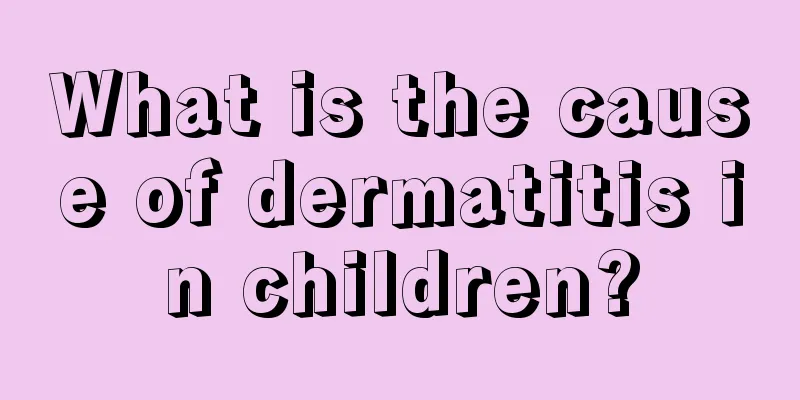Why does my child shiver when sleeping?

|
We often find that newborn babies' arms or feet often shake when they sleep. When you find your baby in this situation, don't worry too much. This is because the baby's nervous system is not fully developed, and the baby lacks a sense of security when he first comes into this world, so he will shake from time to time. As the baby grows older, this situation will gradually improve. Is it normal for babies to shake suddenly while sleeping? The baby's nervous system is not yet fully developed, so occasional shaking is normal. If it continues to occur frequently as the child gets older, you should go to the hospital to check whether it is calcium deficiency or other abnormalities. Usually, you should pay attention to giving your baby proper vitamin D and calcium supplements and let him/her get plenty of sun exposure. It is a normal physiological phenomenon for babies to shake all over their body when they sleep. Because in the early stages of sleep, although most brain cells are in a dormant state, some brain cells are still in an excited state, so there are often shaking hands, feet, wrists, eyelids, etc. In addition, when children are calcium deficient, tremors in their hands and feet may occasionally occur due to increased excitability of the nervous system. However, this type of jitter only occurs during sleep, and the EEG is normal during the attack. If your child shakes frequently after falling asleep and the shaking lasts for a long time, you should have an EEG to rule out the possibility of other diseases. When the baby is in a light sleep state, he may sometimes shake, talk in his sleep, move his hands and feet, etc., which are mostly unconscious. Don't worry, the baby's sleep process is cyclical. In each sleep cycle, there are two forms of deep sleep and light sleep, which cycle back and forth. When the baby enters the light sleep stage, he may show some sleep-disrupting behaviors such as moving eyes, head, limbs, and making sounds, which are generally normal. At this time, parents should not rush to disturb the baby or change his sleeping state. They can pat the baby appropriately and the baby may continue to sleep. Causes and care of children's sleep disorders The primary cause of sleep disorders in children is mental stimulation, such as being frightened, or having distress that they don't want to let their parents know. Or family relationships are tense, and people always live in depression, etc. The second most common disease is specific skin disease, among which 90% of children are under 5 years old, and their sleep is affected by scratching their skin at night. 1. Sweating after falling asleep: Some children sweat after falling asleep, and even sweat so much that their underwear gets wet. Parents are often very worried and think that their children are calcium deficient. So, why do children sweat a lot after falling asleep? In fact, sweating after children fall asleep is mostly a normal physiological phenomenon. Children have an active metabolism, produce a lot of heat, contain a lot of water in their bodies, have thin skin, and have abundant blood vessels in their skin. Sweating helps dissipate heat and maintain a constant body temperature. At the same time, sweating can excrete metabolic waste such as urea and fatty acids from the body. Sweat can also moisturize the skin and keep it moisturized. Children's nervous systems are not fully developed. When they fall asleep, their sympathetic nerves become temporarily excited, causing sweating. Therefore, if children simply sweat a lot but are in generally good condition, it is unlikely that they are calcium deficient. If in addition to excessive sweating, you also have symptoms such as sleep disturbance, startle, and hair loss on the back of the head, you may be suffering from calcium deficiency and should seek medical attention promptly. 2. Sleep disorders: As children are in the peak period of growth and development, they have a high demand for sleep. This is because sleep is related to the secretion of growth hormone. Human growth and development depends on the growth hormone secreted by the pituitary gland. The growth hormone is secreted in the largest amount during sleep; the synthesis of various nutrients in the human body can only be better completed during sleep and rest. Therefore, if children get enough sleep, they will grow and develop faster. The younger you are, the more sleep you should get. Therefore, parents should pay extra attention to their children's sleep to avoid sleep disorders. Sleep disorders are extremely common among infants and young children. According to statistics, 30% of children have experienced this problem before the age of 4, and the most common age is between 8 months and 2 years old. Sleep disorders in children have the following symptoms: frequent waking up at night, restless sleep, fear of darkness, teeth grinding, enuresis, talking incoherently, sleepwalking, shaking the body, scratching the skin, difficulty falling asleep, etc. |
<<: 3-year-old baby height and weight
>>: 5-year-old baby height and weight
Recommend
100-day-old baby's head is not stable
For couples who have just become parents, they wi...
What to do if your baby has ringworm
As we all know, most families in China can only h...
What should I do if my baby has cold hands and feet and a fever?
The baby's physical health is what parents ca...
One year old baby has dry stool
The health of babies is the concern and worry of ...
What should I do if my baby always bites his lower lip?
Some babies have abnormal phenomena, especially s...
What should I do if my child has poor stamina?
The physical health of children is very important...
20-month-old baby recipes
When the baby is 20 months old, the diet must be ...
Is it harmful if children are not vaccinated?
Vaccination is a responsibility and an obligation...
What should I do if my 4-year-old baby has allergies?
Children around four years old already have stron...
The dangers of children taking birth control pills by mistake
Contraceptive pills are a common contraceptive me...
What should I do if my 1-year-old baby has a fever?
Babies are very prone to fever because their phys...
Baby sleeping
If a baby who is less than one month old makes gr...
How does Traditional Chinese Medicine treat anemia in children?
In fact, many people have explored the issue of a...
Can baby hypothyroidism be cured?
The function of the thyroid gland plays a very im...
Red pimples on children's body are very itchy
When children are young, their bodies are not ful...









